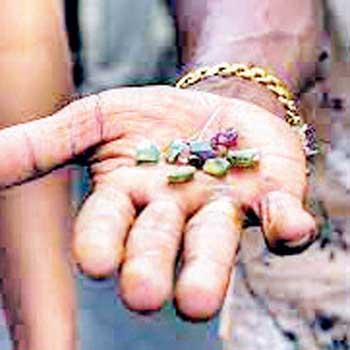Reply To:
Name - Reply Comment
 The Export Development Board (EDB) yesterday said Sri Lanka’s gem and jewellery sector is under serious threat, due to a surge in foreign traders’ involvement in key gem markets without the required licences, threatening the sector’s integrity and sustainability.
The Export Development Board (EDB) yesterday said Sri Lanka’s gem and jewellery sector is under serious threat, due to a surge in foreign traders’ involvement in key gem markets without the required licences, threatening the sector’s integrity and sustainability.
An advisory committee of the export promotions agency pointed out that the presence and influence of illegal foreign traders and buyers at the China Fort Gem Market and Ratnapura have become a major challenge to the local gem traders.
“While these markets have brought new opportunities to the industry, it has also presented specific challenges that require careful navigation,” the advisory committee on the gems, diamonds and jewellery sector of the EDB said in a statement, yesterday.
The primary challenge faced by the Beruwala Gem Market and Ratnapura is the intensified competition from illegal foreign traders.
According to the committee, the so-called foreign traders arrive in Sri Lanka using a visit visa and engage in gem business without any licence from the National Gem and Jewellery Authority. Obtaining the necessary licence from the authority is mandatory to engage in gem trade.
“This unlicensed gem trading could seriously damage Sri Lanka’s reputation, as it can lead to a lot of malpractices. These foreign traders have a wider range of buyer and seller access via online platforms, as they do more with online channels,” the committee added. The increasing participation of the foreign traders and buyers in the Beruwala Gem Market and Ratnapura adds pressure on the local traders and pushes towards smuggling, the committee cautioned.
Further, the money for gem purchases is being brought into the country without following any government rules and regulations. Similarly, the purchased stones are also taken out unofficially without being regulated.
Traditional Sri Lankan dealers on the other hand are subjected to all taxes and regulations, the committee pointed out.
As a result, the miners, dealers and brokers tend to sell stones to these foreigners for cash without any documentation. “This has badly affected the exporters, who are using the official channels to obtain merchandise for exports. Also, this will reduce the government tax revenue and employment opportunities,” the committee cautioned.
The committee called on the government to focus on making local traders more competitive by addressing such issues.